1850-1895
Summary
This week’s lecture focused in on the many creative movements that took place during the time period of 1850-1895. As Queen Victoria was crowned the new British queen, there came the beginning of a new era – The Victorian era. During this time, the King and Queen opened up the Great Exhibition, opened up new influences, technologies and materials into play. Many buildings and large monuments such as the Eiffel Tower and the Statue of Liberty were built to express their access to these new materials and technologies.
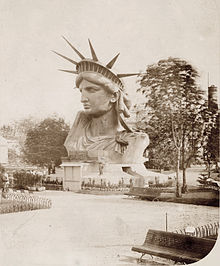
The statue’s head on exhibit at the Paris World’s Fair, 1878
On the other hand, an English writer and active socialist, William Morris, began a vast reaction to the excesses of the Victorian culture. This reaction was called the Arts & Crafts movement. Morris valued simplicity and craftsmen work and especially drew inspiration from the past. With the continuous development of tools and materials and broader views of the world, artists and designers continued to push their creative limits to newer heights.
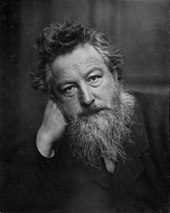
William Morris, the main influence on the Arts and Crafts Movement
Research
Ukiyo-E
What is it?
Ukiyo-e is a genre of art established in Japan during the 17th century and was active all the way through till the 19th century. It is an art mass produced by the techniques of woodblock printing presenting common motifs of beautiful women, travel scenes, landscapes, history folk tales and so much more. The word “Ukiyo-e” translates to “pictures of the floating world.” The term derives from the idea of the economic rise of the middle class who had demonstrated a carefree energy through the Edo era.
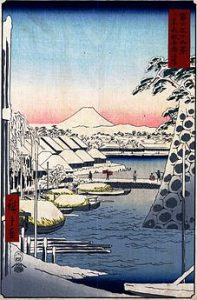
Hiro Shige’s Sukiyagashi in the Eastern Capital
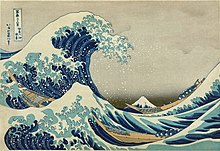
The Great Wave off Kanagawa, Hokusai’s most famous print, the first in the series 36 Views of Mount Fuji
The craftsmanship of Ukiyo-e consists of a collaboration of four workers; A designer, a carver, a printer, and a publisher. The designer is one who establishes the creative decisions of the piece by illustrating the image. This image is then handed to the carver who delicately carves the design onto woodblocks. Coloring the artwork consisted of dedicating carved blocks to one solid color, or by hand painting after the printing process. There appears to be more creative flexibility in hand painting color, such as colored gradients. After the carving process, woodblocks were sent to the printer to carefully imprint masses of prints to be sold by the publisher. Some notable Ukiyo-e artists include Hishikawa Mornbu, Katsushika Hokusai, Hiroshige Ando, and Utagawa Kuniyoshi.
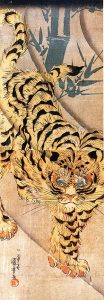
Utagawa_Kuniyoshi’s woodblock print, Tiger
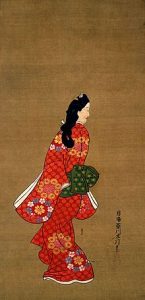
Hishikawa Moronobu’s Beauty Looking back
Influence on Western Painters
As global trade had opened, a new perspective in art had reached the artists and painters of the West. Japanese woodblock prints were a fresh outlook in the western world of art and had influenced the work of many. Artists admired the use of bright colors, dark outlines, patterns, diagonals, and asymmetry found in Ukiyo-e pieces. These elements are evident quite especially in the work of the French artist, Henri de Toulouse-Lautrec. He certainly valued the Ukiyo-e by incorporating them into his posters and prints.
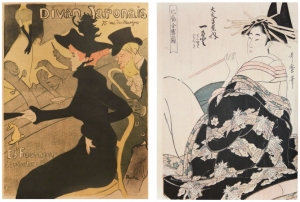
Henri de Toulouse-Lautrec
Divan Japonais, 1892-1893
(Left), Kitagawa Utamaro
Courtesan Hitomoto from the House of Daimonjiya, ca. 1805 (Right)
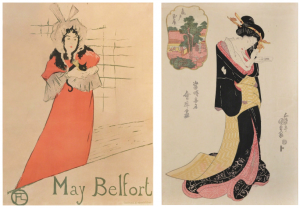
Henri de Toulouse-Lautrec
May Belfort, 1895 (Left), Utagawa Toyokuni III (Utagawa Kunisada)
Tamaya at Kameido, ca. 1826 (Right)
Sources
https://en.wikipedia.org/wiki/Statue_of_Liberty
https://en.wikipedia.org/wiki/Arts_and_Crafts_movement
http://www.vam.ac.uk/content/articles/u/ukiyo-e-pictures-of-the-floating-world/
https://www.artsy.net/article/artsy-ronin-gallery-highlights-the-crucial-influence-japanese-art-had-on-toulouse-lautrec
https://en.wikipedia.org/wiki/Utagawa_Kuniyoshi
https://en.wikipedia.org/wiki/Hiroshige
https://en.wikipedia.org/wiki/Hishikawa_Moronobu
https://en.wikipedia.org/wiki/Hokusai